Charles E W Bean, Diaries, AWM38 3DRL 606/119/1 - Photostats - Part 3
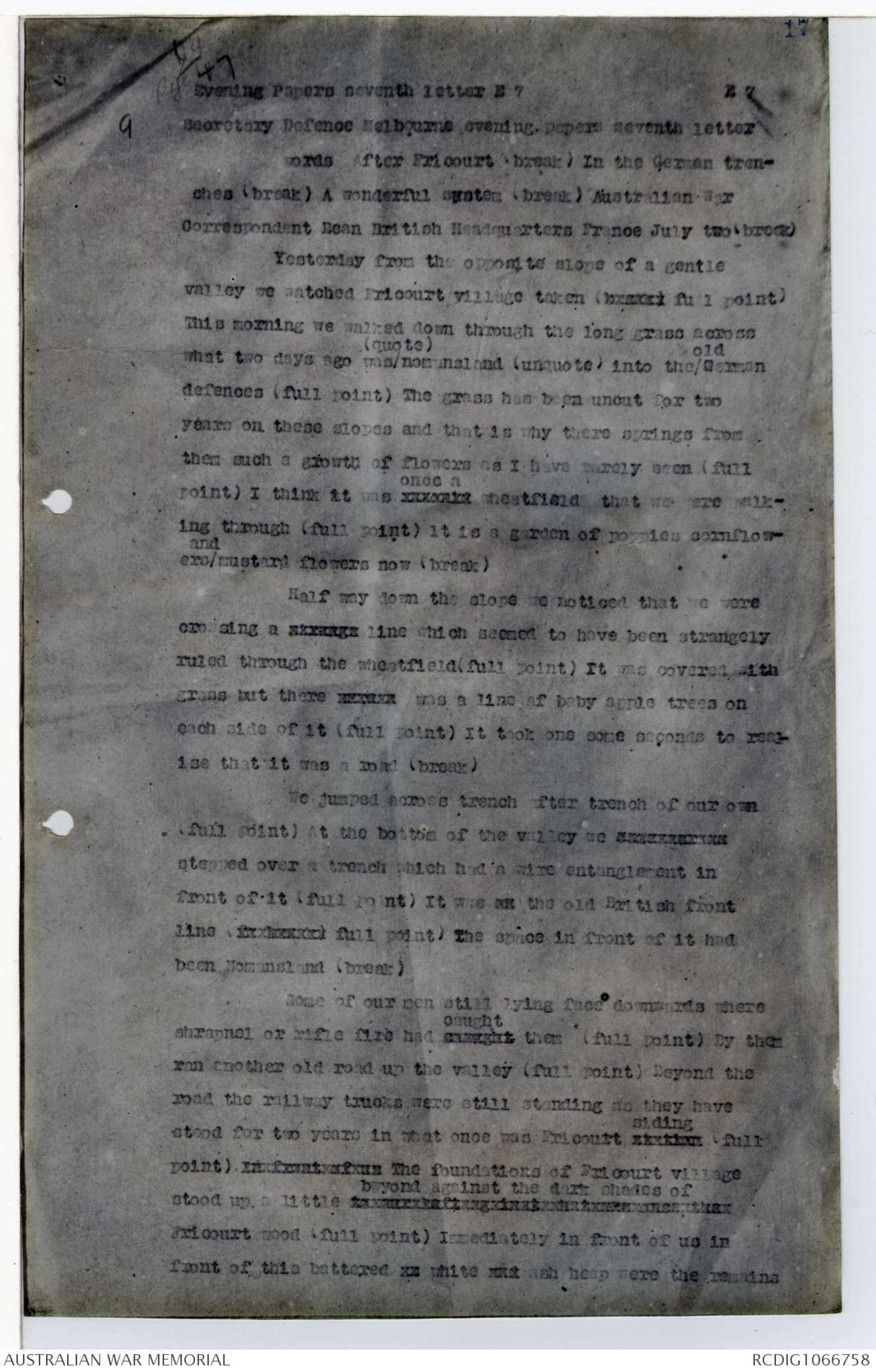
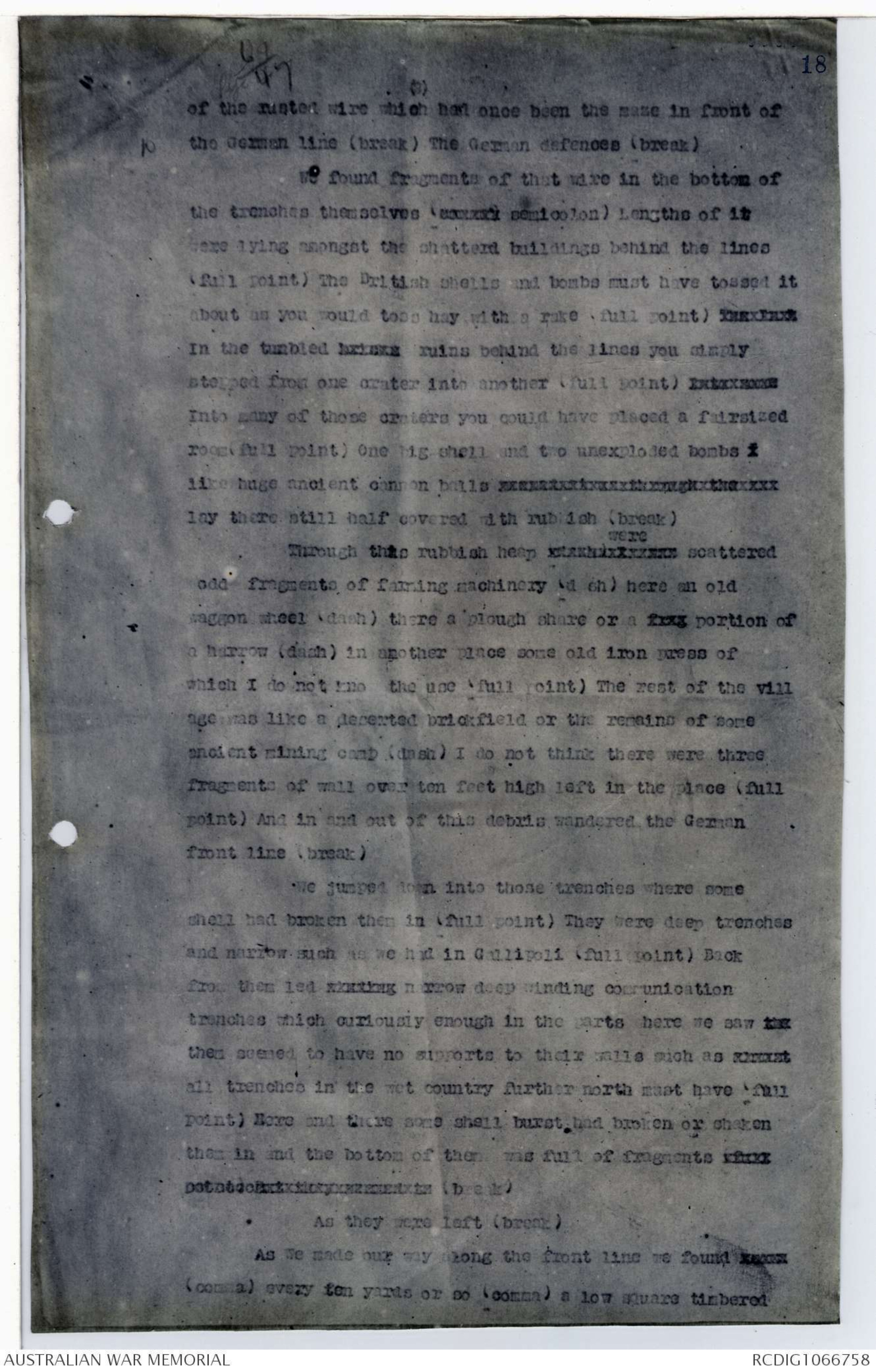
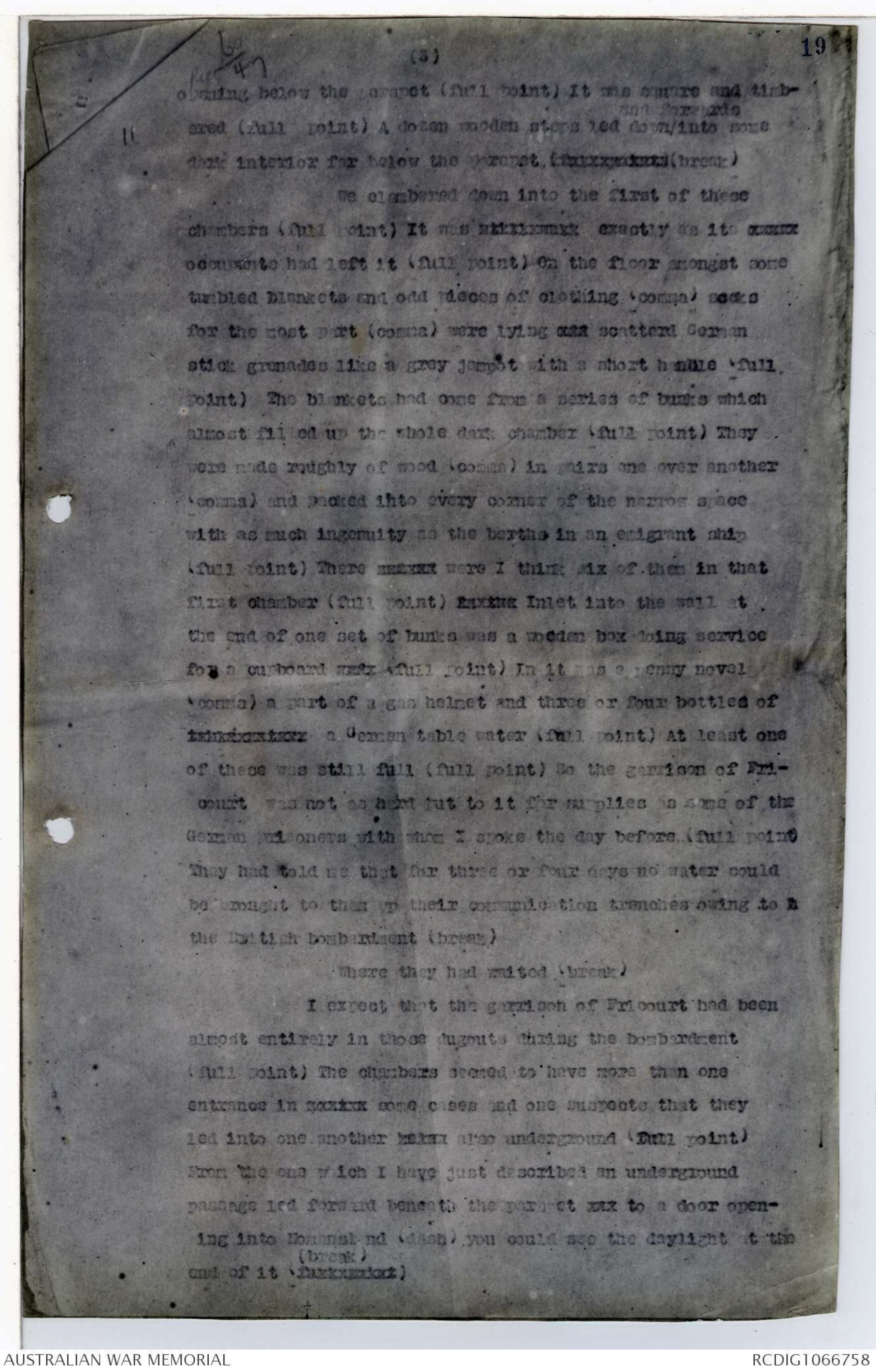
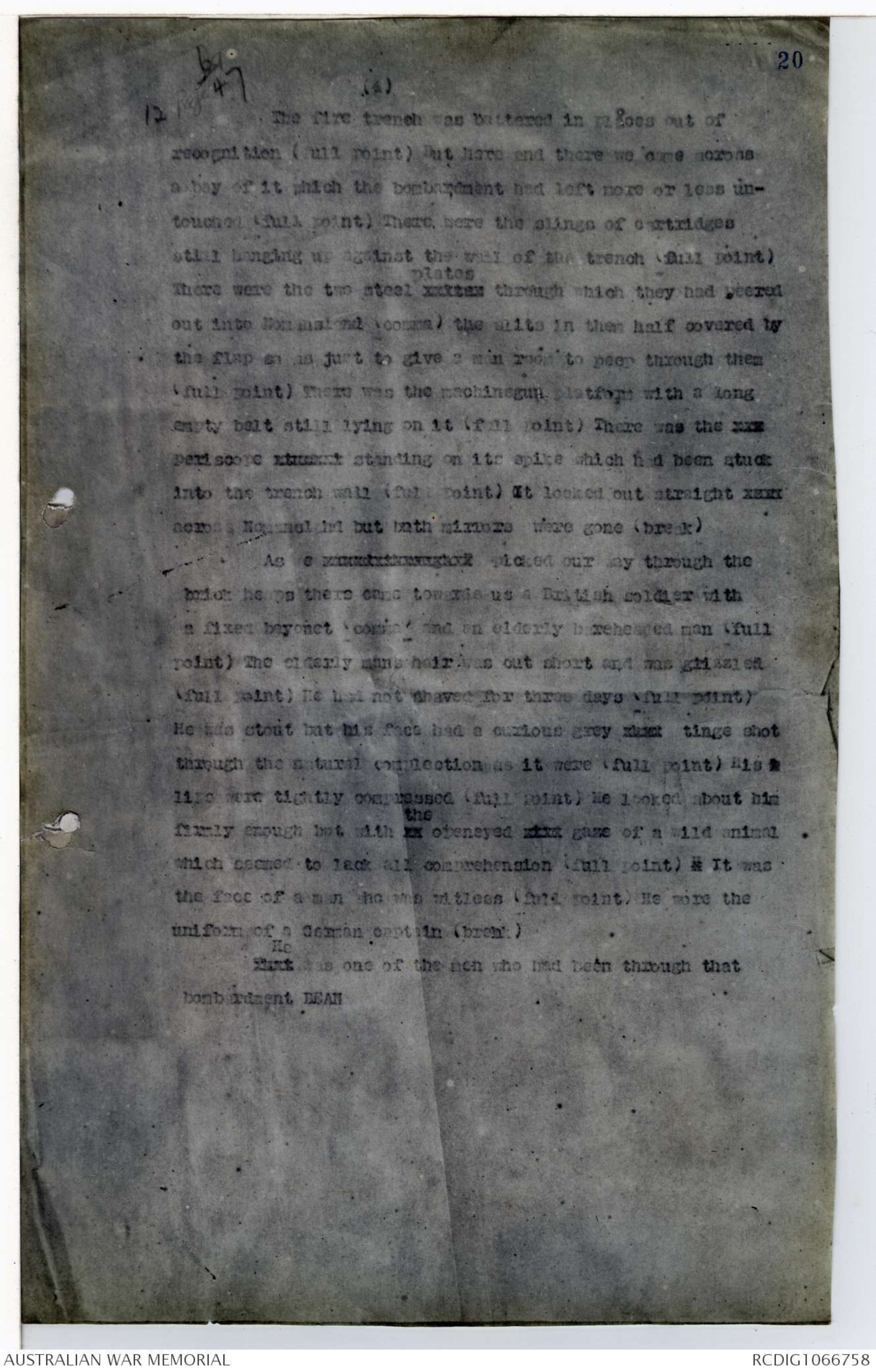
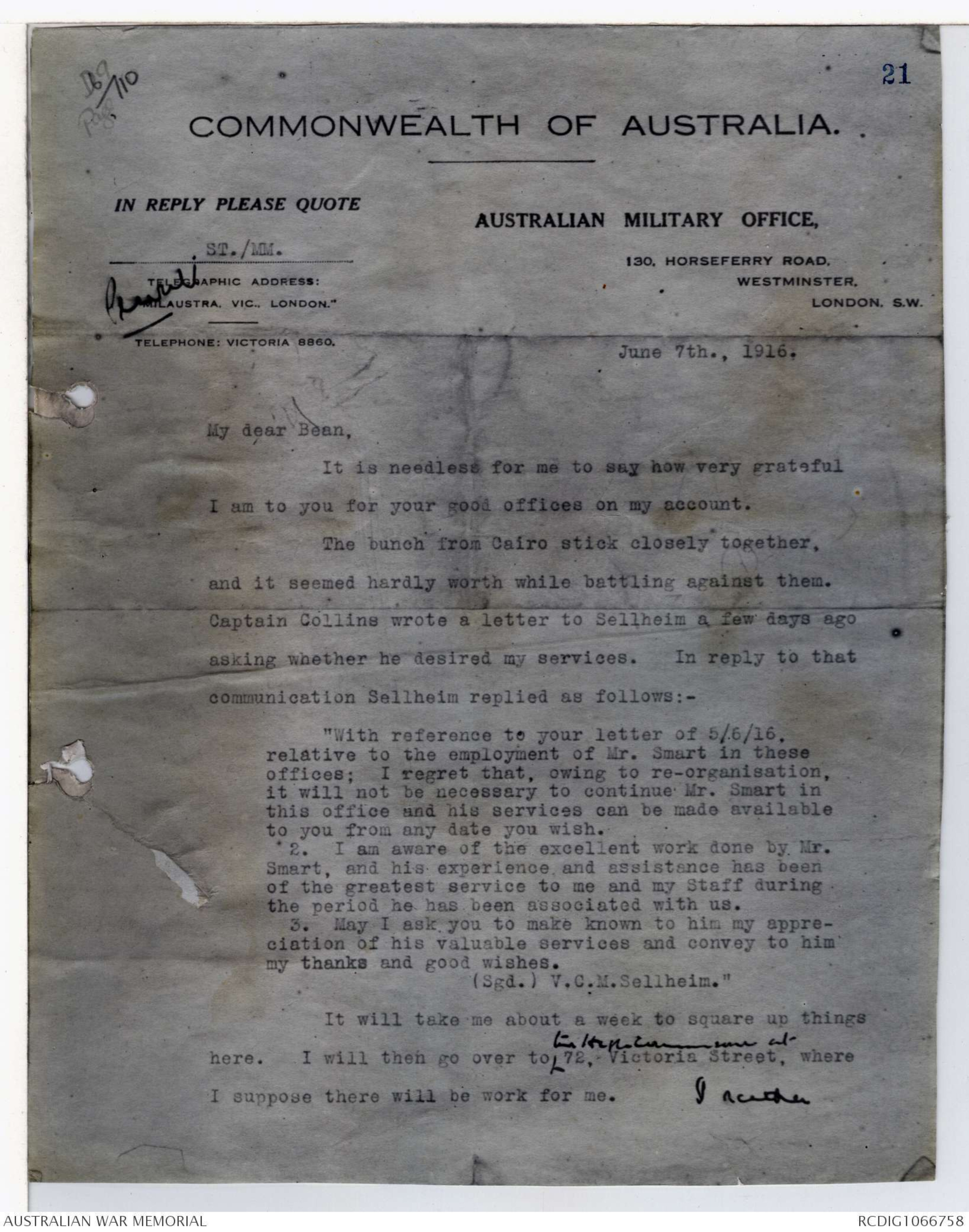
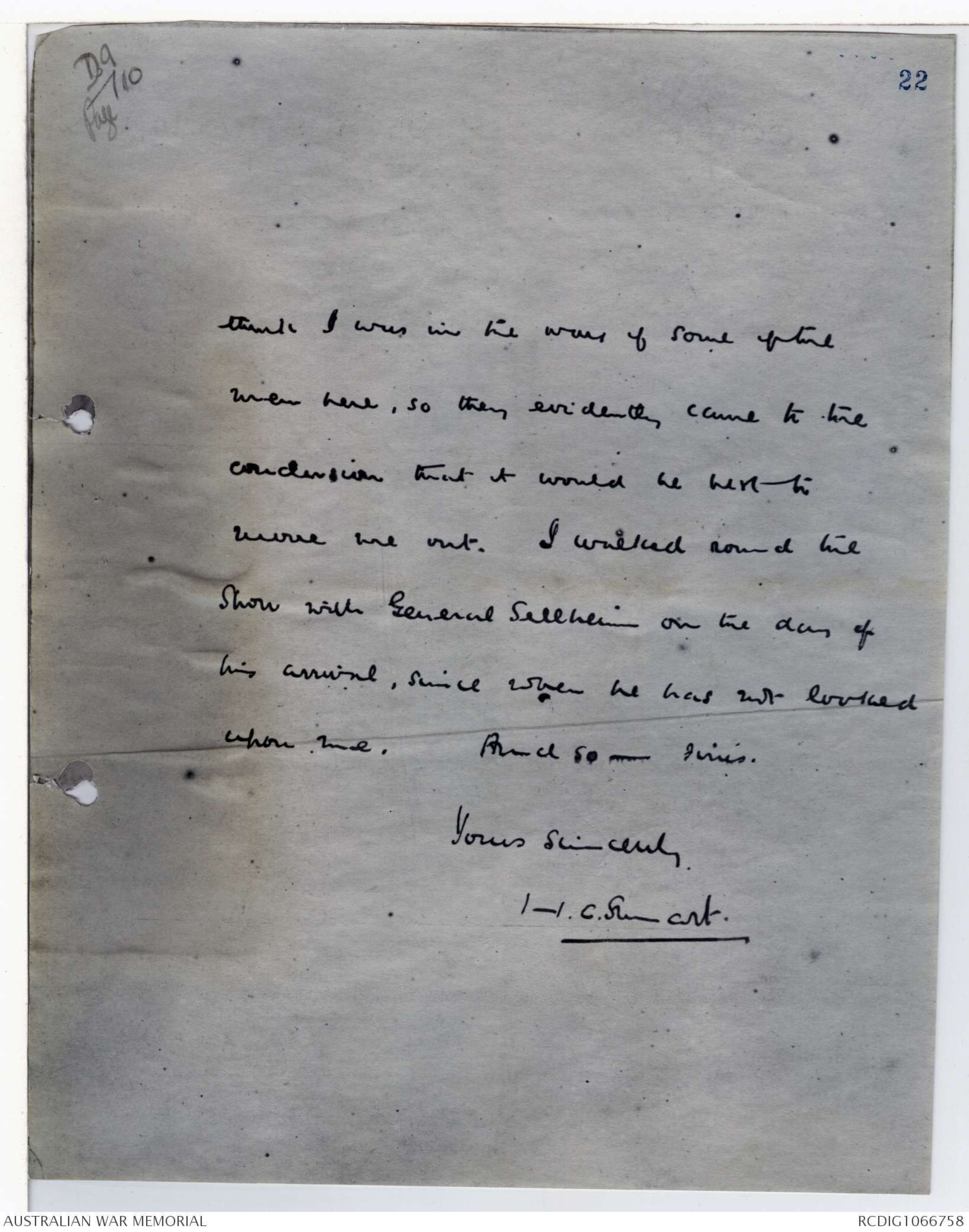
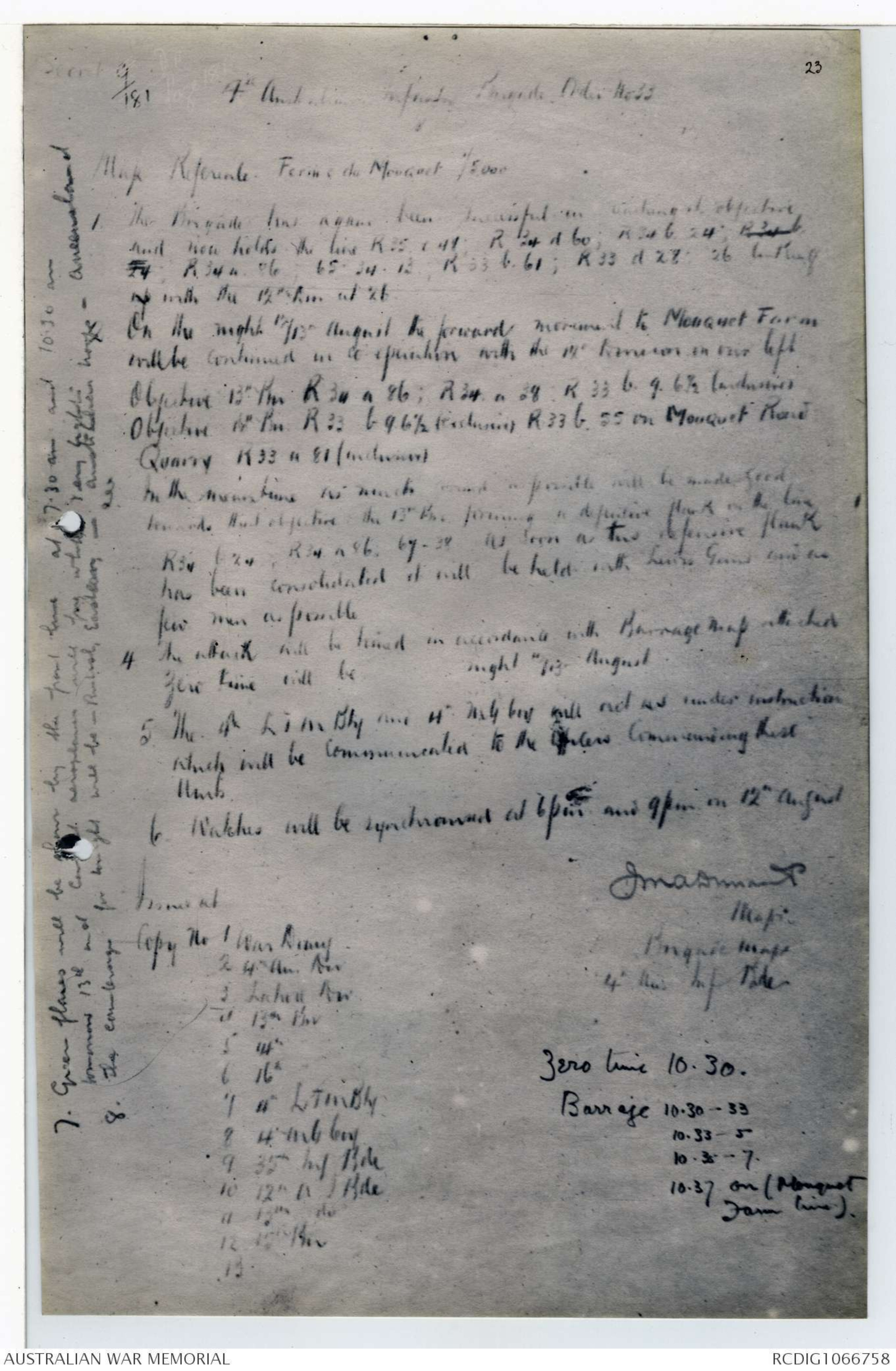
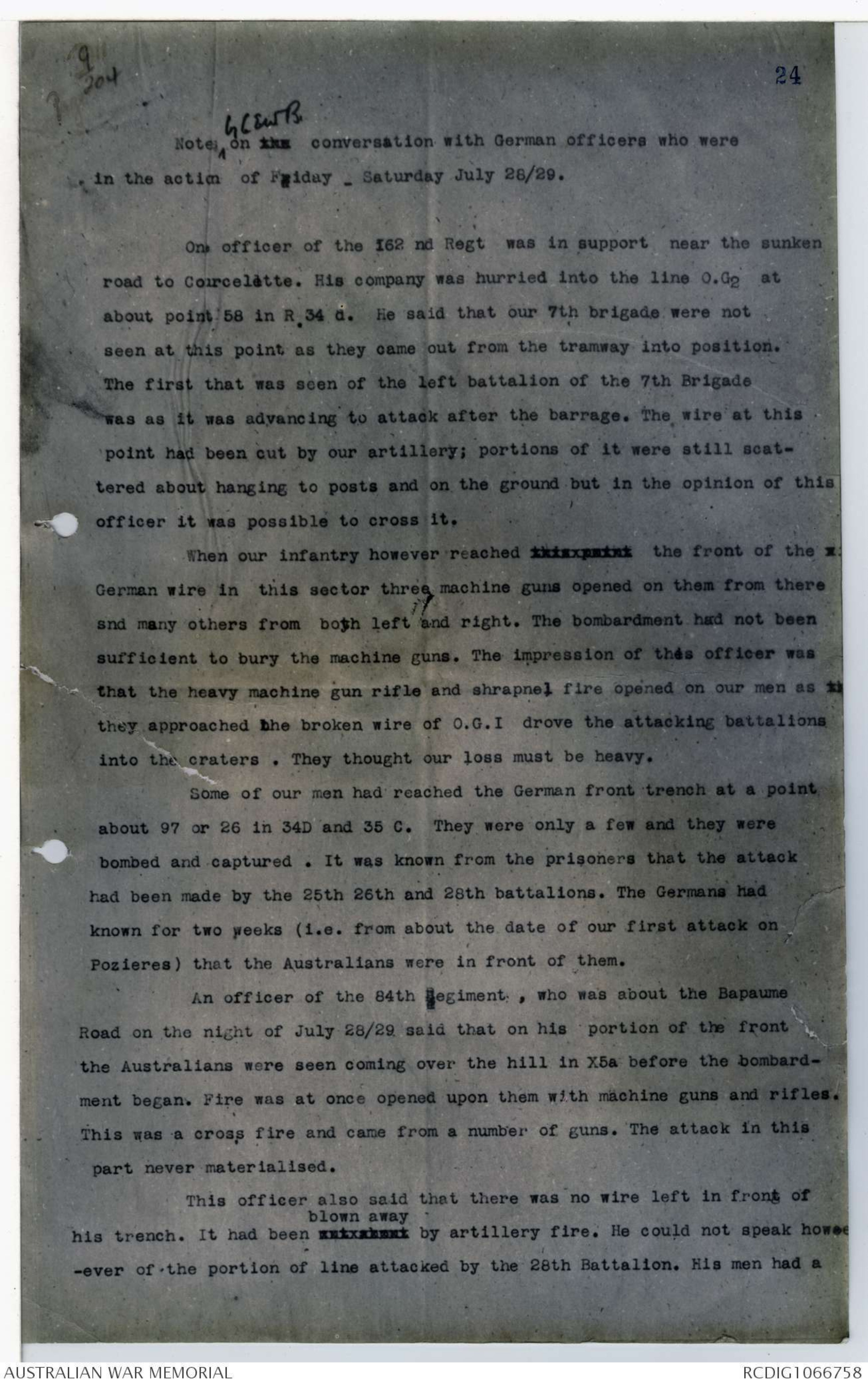
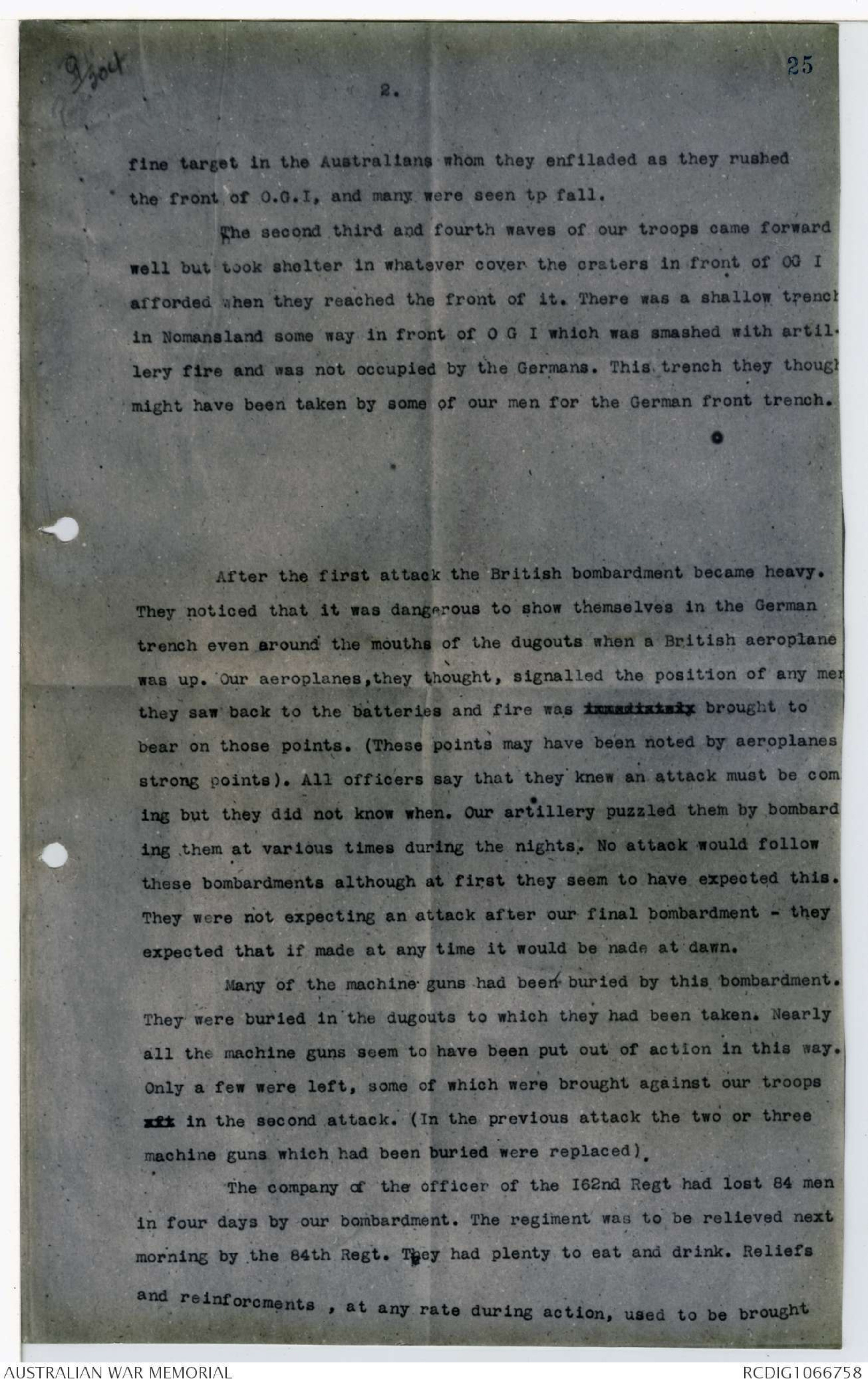
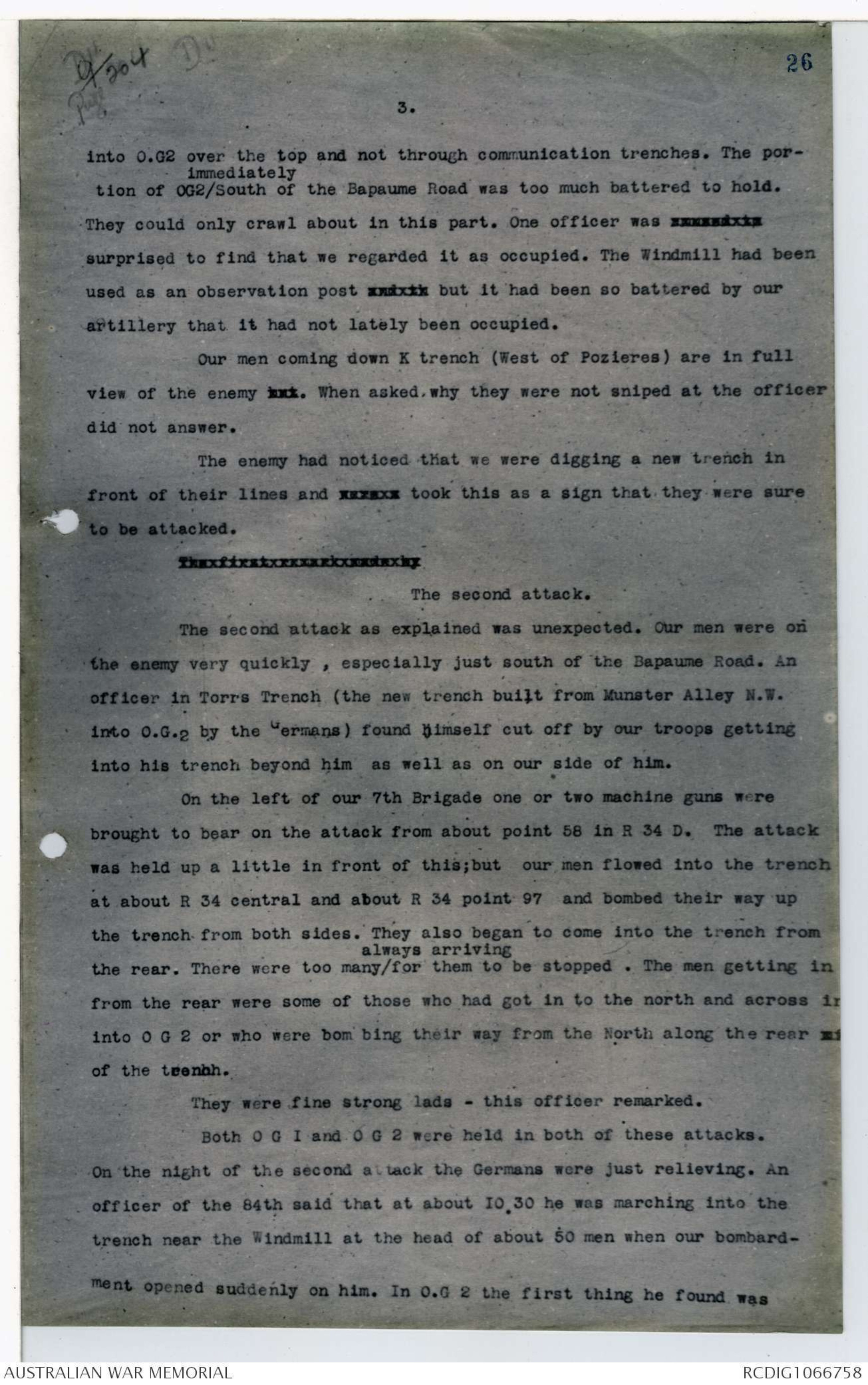
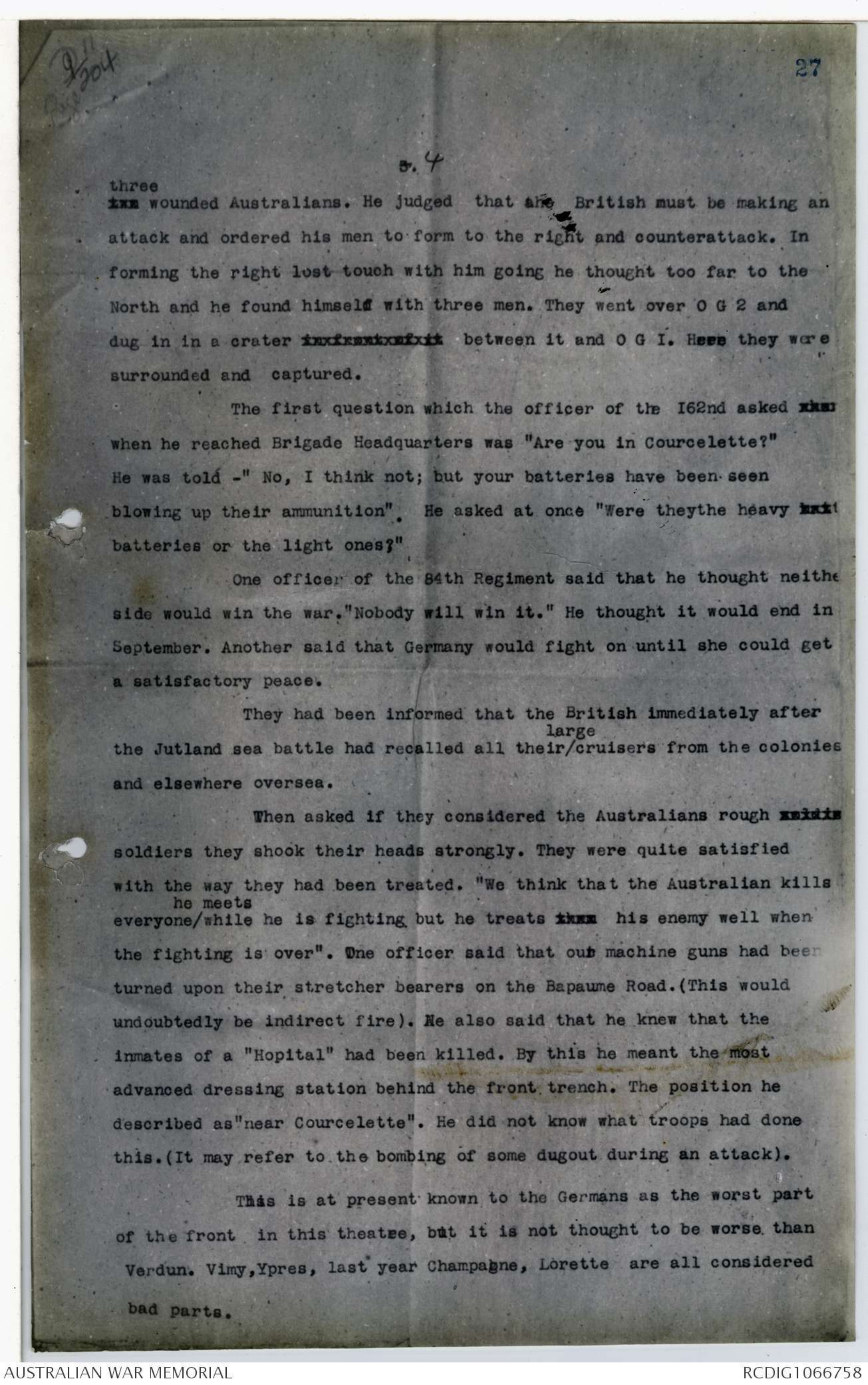
17
D9
Pge 47
9
Evening Papers seventh letter E7
Secretary Defence Melbourne evening papers seventh letter
words After Fricourt (break) in the German trenches
(break) A wonderful system (break) Australian War
Correspondent Bean British Headquarters France July two (break)
Yesterday from the opposite slope of a gentle
valley we watched Fricourt village taken (break) full point)
This morning we walked down through the long grass across
what two days ago was (quote) nomansland (unquote) into the ∧old German
defences (full point) The grass has been uncut for two
years on these slopes and this is why there springs from
them such a growth of flowers as I have rarely seen (full
point) I think it was ∧ once a xxxxxxx wheatfield that we were walking
through (full point) It is a garden of poppies cornflowers
∧and mustard flowers now (break)
Half way down the slope we noticed that we were
crossing a strange line which seemed to have been strangely
ruled through the wheat field (full point) It was covered with
grass but there xxxxxx was a line of baby apple trees on
each side of it (full point) It took one some seconds to realise
that it was a road (break)
We jumped across trench after trench from our own
(full point) At the bottom of the valley we xxxxxxxxxxx
stepped over a trench which had a wire entanglement in
front of it (full point) It was xx the old British front
line xxxxxx full point). The space in front of it had been
Nomansland (break)
Some of our men still lying face downwards where
shrapnel or rifle fire had xxxxxxx ∧caught them (full point) By them
ran another old road up the valley (full point) Beyond the
road the railway trucks were still standing as they have
stood for two years in what once was Fricourt xxxxxxx ∧siding (full
point) In front of us The foundations of Fricourt village
stood up a little ∧beyond against the dark shades of xxxxxxxxxxxxxx
Fricourt wood (full point) Immediately in front of us in
front of this battered xx white xxx ash heap were the remains
18
6/47
10
(2)
of the rusted wire which had once been the maze in front of
the German line (break) The German defences (break)
We found fragments of that wire in the bottom of
the trenches themselves (xxxxxxx semicolon) Lengths of it
were lying amongst the shattered buildings behind the lines
(full point) The British shells and bombs must have tossed it
about as you would toss hay with a rake (full point) xxxxxxxx
In the tumbled bricks ruins behind the lines you simply
stepped from one crater into another (full point) xxxxxxxxx
Into many of those craters you could have placed a fairsized
room (full point) One big shell and two unexploded bombs x
like huge ancient cannon balls xxxxxxxxxxxxxxxx
lay there still half covered with rubbish (break)
Through this rubbish heap xxxxxxxxxxx ∧were scattered
odd fragments of farming machinery (dash) here an old
waggon wheel (dash) there a plough share or a xxxx portion of
a harrow (dash) in another place some old iron press of
which I do not know the use (full point) The rest of the village
was like a deserted brickfield or the remains of some
ancient mining camp (dash) I do not think there were three
fragments of wall over ten feet high left in the place (full
point) And in and out of this debris wandered the German
front line (break)
We jumped down into those trenches where some
shell had broken them in (full point) They were deep trenches
and narrow such as we had in Gallipoli (full point) Back
from them led xxxxxxx narrow deep winding communication
trenches which curiously enough in the parts here we saw xxx
them seemed to have no supports to their walls such as xxxxxx
all trenches in the wet country further north must have (full
point) Here and there some shell burst had broken or shaken
them in and the bottom of them was full of fragmentsxxxxx xxxxxxxxxxx (break)
As they were left (break)
As we made our way along the front line we found xxxxxx
(comma) every ten yards or so (comma) a low square timbered
19
6/47
11
(3)
opening below the parapet (full point) It was square and timbered
(full point) A dozen wooden steps led down ∧and forwards into some
dark interior far below the parapet (xxxxxx (break)
We clambered down into the first of these
chambers (full point) It was xxxxxx exactly as its xxxxxx
occupants had left it (full point) On the floor amongst some
tumbled blankets and odd pieces of clothing (comma) socks
for the most part (comma) were lying xxx scattered German
stick grenades like a grey jampot with a short handle (full
point) The blankets had come from a series of bunks which
almost filled up the whole dark chamber (full point) They
were made roughly of wood (comma) in pairs one over another
(comma) and packed into every corner of the narrow space
with as much ingenuity as the berths in an emigrant ship
(full point) There xxxxxx were I think six of them in that
first chamber (full point) xxxxxx Inlet into the wall at
the end of one set of bunks was a wooden box doing service
for a cupboard xxxx (full point) In it was a penny novel
(comma) a part of a gas helmet and three or four bottles of
xxxxx a German table water (full point) At least one
of these was still full (full point) So the garrison of Fricourt
was not as hard put to it for supplies as some of the
German prisoners with whom I spoke the day before (full point)
They had told me that for three of four days no water could
be brought to them up their communication trenches owing to a
the British bombardment (break)
Where they waited (break)
I expect that the garrison of Fricourt had been
almost entirely in those dugouts during the bombardment
(full point) The chambers seemed to have more than one
entrance in xxxxxx some cases and one suspects that they
led into one another xxxxx also underground (full point)
From the one which I have just described an underground
passage led forward beneath the parapet xxx to a door opening
into Nomansland (dash) you could see the daylight at the
end of it xxxxxxxxx (break)
20
6/47
12
(4)
The fire trench was battered in places out of
recognition (full point) But here and there we came across
a bay of it which the bombardment had left more or less untouched
(full point) There were the slings of cartridges
still hanging up against the wall of the trench (full point)
There were the two steel xxxxxx ∧plates through which they peered
out into Nomansland (comma) the slits in them half covered by
the flap so is just to give a man room to peep through them
(full point) There was the machine gun platform with a long
empty belt still lying on it (full point) There was the xxx
periscope xxxxx standing on its spike which had been stuck
into the trench wall (full point) It looked out straight xxxx
across Nomansland but both mirrors were gone (break)
As we xxxxxxxx picked our way through the
brick heaps there came towards us a British soldier with
a fixed bayonet (comma) and an elderly bareheaded man (full
point) The elderly mans hair was cut short and was grizzled
(full point) He had not shaved for three days (full point)
He was stout but his face had a curious grey xxxx tinge shot
through the natural complection as it were (full point) His x
lips were tightly compressed (full point) He looked about him
firmly enough but with xx the openeyed xxxx gaze of a wild animal
which seemed to lack all comprehension (full point) x It was
the face of a man who was witless (full point) He wore the
uniform of a German captain (break)
xxxx ∧He was one of the men who had been through that
bombardment BEAN
6/110
21
COMMONWEALTH OF AUSTRALIA.
IN REPLY PLEASE QUOTE
ST./MM.
Private
TELEGRAPHIC ADDRESS:
MILAUSTRA. VIC., LONDON"
TELEPHONE: VICTORIA 8860.
AUSTRALIAN MILITARY OFFICE,
130, HORSEFERRY ROAD.
WESTMINSTER.
LONDON, S.W.
June 7th., 1916,
My dear Bean,
It is needless for me to say how very grateful
I am to you for your good offices on my account.
The bunch from Cairo stick closely together,
and it seemed hardly worth while battling against them.
Captain Collins wrote a letter to Sellheim a few days ago
asking whether he desired my services. In reply to that
communication Sellheim replied as follows:-
"With reference to your letter of 5/6/16,
relative to the employment of Mr. Smart in these
offices; I regret that, owing to re-organisation,
it will not be necessary to continue Mr. Smart in
this office and his services can be made available
to you from any date you wish.
2. I am aware of the excellent work done by Mr.
Smart, and his experience and assistance has been
of the greatest service to me and my Staff during
the period he has been associated with us.
3. May I ask you to make known to him my appreciation
of his valuable services and convey to him
my thanks and good wishes.
(Sgd.) V.C.M.Sellheim."
It will take me about a week to square up things
here. I will then go over to ^the High Commission at 72, Victoria Street, where
I suppose there will be work for me.
I Scuther
D9/110
Page 22
think I was in the way of some of the
men here, so they evidently came to the
conclusion that it would be best to
move me out. I walked around the
show with General Sellheim on the day of
his arrival, since when he has not looked
upon me. [[Around 50 -- times?]]
Yours sincerely
1-1. C. Smart
9/181
23
Secret
4th Australian Infantry Brigade Order No 33
Map Reference. Farm du Mouquet /5000
- The Brigade has again been successful in unchanged objective
and now holds the line R35 & 41; R 34 d 60; R34 6. 24; B34 6
24 R 34 a.86; 65.34.13; R 33.b.61; R 33 d 28; 26 linking
up with the 12th Div at 26.
2. On the night 12/13th August the forward movement to Mouquet Farm
will be continued in co-operation with the 12 Divison on our left
Objective 13th Bn R 30 a 86; R 34 a 38; R 33 b. 9. 6 ½ (inclusive)
Objective 14th Bn R 33 b 9.6½ (exclusive) R 33 b. 55 on Mouquet Road
Quarry R 33 a 81 (inclusive)
3. In the meantime as much ground as possible will be made good
towards that objective the 13th Bn. forming a defensive flank on the line
R34 b 24, R 34 a 86. 67-38 As soon as the defensive flank
has been consolidated it will be held with Lewis Guns with as
few men as possible.
4. The attack will be timed in accordance with Barrage map attached
Zero time will be night 13 August.
5. The 4th L I M Bty and 4th MG Coy will act as under instruction
which will be communicated to the Officers commanding these
Units.
6. Watches will be synchronised at 6pm and 9pm on 12th August
7. Green flares will be shown by the front line at 7.30 am and 10.30am
tomorrow 13th and [[?]] aeroplanes will fly without any lights.
8. The [[?]] for tonight will be - British, [[Eastern?]] - Australian troops - Queensland
J M A Durrant
Major
Brigade Major
4th Aus Inf Bde
Issue at
Copy No 1 War Diary
2 4th Au. Div
3 Labour Div
4 13th Bn
5 14th
6 16th
7 4th LTM Bty
8 4th MG Coy
9 35 Inf Bde
10 12th Inf Bde
11 13th do
12 15th Bn
13
Zero time 10.30
Barrage 10.30-33
10.33-5
10.35-7
10.37 on (Mouquet
Farm line.)
9/204
24
Note: ^by CEWB on xxx conversation with German Officers who were
in the action of Friday _ Saturday July 28/29.
One officer of the 162nd Regt was in support near the sunken
road to Courcelette. His company was hurried into the line O.G2 at
about point 58 in R.34 d. He said that our 7th brigade were not
seen at this point as they came out from the tramway into position.
The first that was seen of the left battalion of the 7th Brigade
was as it was advancing to attach after the barrage. The wire at this
point had been cut by our artillery; portions of if were still scattered
about hanging to posts and on the ground but in the opinion of this
officer it was possible to cross it.
When our infantry however reached thispoint the front of the
German wire in this sector three machine guns opened on them from there
and many others from both left and right. The bombardment had not been
sufficient to bury the machine guns. The impression of this officer was
that the heavy machine gun rifle and shrapnel fire opened on our men as
they approached the broken wire of O.G.1 drove the attacking battalions
into the craters. They thought our loss must be heavy.
Some of our men reached the German front trench at a point
about 97 or 26 in 34D and 35C. They were only a few and they were
bombed and captured. It was known from the prisoners that the attack
had been made by the 25th 26th and 28th battalions. The Germans had
known for two weeks (i.e. from about the date of our first attack on
Pozieres) that the Australians were in front of them.
An officer of the 84th Regiment, who was about the Bapaume
Road on the night of July 28/29 said that on his portion of the front
the Australians were seen coming over the hill in X5a before the
bombardment began. Fire was at once opened upon them with machine guns and rifles. This was a cross fire and came from a number of guns. The attack in this
part never materialised.
This officer also said that there was no wire left in front of
his trench. It had been xxxxxxxxx blown away by artillery fire. He could not speak howee-ever of the portion of line attacked by the 28th Battalion. His men had a
9/204
25
2.
fine target in the Australians whom they enfiladed as they rushed
the front of O.G.1, and many were seen to fall.
The second third and fourth waves of our troops came forward
well but took shelter in whatever cover the craters in front of OG1
afforded when they reached the front of it. There was a shallow trench
in Nomansland some way in front of O G 1 which was smashed with
artillery fire and was not occupied by the Germans. This trench they thought
might have been taken by some of our men for the German front trench.
After the first attack the British bombardment became heavy.
They noticed that it was dangerous to show themselves in the German
trench even around the mouths of the dugouts when a British aeroplane
was up. Our aeroplanes, they thought, signalled the position of any men
they saw back to the batteries and fire was immediately brought to
bear on those points. (These points may have been noted by aeroplanes
strong points). All officers say that they knew an attack must be
coming but they did not know when. Our artillery puzzled them by
bombarding them at various times during the nights. No attack would follow
these bombardments although at first they seem to have expected this.
They were not expecting an attack after our final bombardment -
they expected that if made at any time it would be made at dawn.
Many of the machines guns had been buried by this bombardment.
They were buried in the dugouts to which they had been taken. Nearly
all the machine guns seem to have been put out of action in this way.
Only a few were left, some of which were brought against our troops
xxx in the second attack. (In the previous attack the two or three
machine guns which had been buried were replaced).
The company of the officer of the 162nd Regt had lost 84 men
in four days by our bombardment. The regiment was to be relieved next
morning by the 84th Regt. They had plenty to eat and drink. Reliefs
and reinforcements, at any rate during action, used to be brought
9/204
26
3.
into O.G2 over the top and not through communication trenches. The portion
of OG2^immediately South of the Bapaume Road was too much battered to hold.
They could only crawl about in this part. One officer was xxxxxxxx
surprised to find that we regarded it as occupied. The Windmill had been
used as an observation post xxxxxx but it had been so battered by our
artillery that it had not lately been occupied.
Our men coming down K trench (West of Pozieres) are in full
view of the enemy xxx. When asked why they were not sniped at the officer
did not answer.
The enemy had noticed that we were digging a new trench in
front of their lines and xxxxxx took this as a sign that they were sure
to be attacked.
The first xxxxxxxxxxxxxby
The second attack.
The second attack as explained was unexpected. Our men were on
the enemy very quickly, especially just south of the Bapaume Road. An
officer in Torrs Trench (the new trench built from Munster Alley N.W
into O.G.2 by the Germans) found himself cut off by our troops getting
into his trench beyond him as well as on our side of him.
On the left of our 7th Brigade one or two machine guns were
brought to bear on the attack from about point 58 in R 34 D. The attack
was held up a little in front of this; but our men flowed into the trench
at about R 34 central and about R 34 point 97 and bombed their way up
the trench from both sides. They also began to come into the trench from
the rear. There were too many ^always arriving for them to be stopped. The men getting in
from the rear were some of those who had got in to the north and across in
into O G 2 or who were bombing their way from the North along the rear
of the trench.
They were fine strong lads - this officer remarked.
Both O G 1 and O G 2 were held in both of these attacks.
On the night of the second attack the Germans were just relieving. An
officer of the 84th said that at about 10.30 he was marching into the
trench near the Windmill at the head of about 50 men when our bombardment opened suddenly on him. In O.G 2 the first thing he found was
9/204
27
5 4.
xxx three wounded Australians. He judged that the British must be making an
attack and ordered his men to form to the right and counterattack. In
forming the right lost touch with him going he thought too far to the
North and he found himself with three men. They went over O G 2 and
dug in in a crater infrontofit between it and O G 1. Here they were
surrounded and captured.
The first question which the officer of the 162nd asked xxx
when he reached Brigade Headquarters was "Are you in Courcelette?"
He was told -"No, I think not; but your batteries have been seen
blowing up their ammunition". He asked at once "Were they the heavy xxx
batteries or the light ones?"
One officer of the 84th Regiment said that he thought neither
side would win the war. "Nobody will win it." He thought it would end in
September. Another said that Germany would fight on until she could get
a satisfactory peace.
They had been informed that the British immediately after
the Jutland sea battle had recalled all their ^large cruisers from the colonies
and elsewhere oversea.
When asked if they considered the Australians rough xxxxx
soldiers they shook their heads strongly. They were quite satisfied
with the way they had been treated. "We think that the Australian kills
everyone ^he meets while he is fighting but he treats xxxx his enemy well when
the fighting is over". One officer said that our machine guns had been
turned upon their stretcher bearers on the Bapaume Road. (This would
undoubtedly be indirect fire). He also said that he knew that the
inmates of a "Hospital" had been killed. By this he meant the most
advanced dressing station behind the front trench. The position he
described as "near Courcelette". He did not know what troops had done
this. (It may refer to the bombing of some dugout during an attack).
This is at present known to the Germans as the worst part
of the front in this theatre, but it is not thought to be worse than
Verdun. Vimy, Ypres, last year Champagne, Lorette are all considered
bad parts.
 Sam scott
Sam scottThis transcription item is now locked to you for editing. To release the lock either Save your changes or Cancel.
This lock will be automatically released after 60 minutes of inactivity.